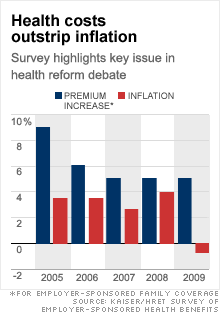Family health costs jump 5%
New survey finds workers and employers are paying more for health insurance this year than last, and substantially more than they did 10 years ago.

NEW YORK (CNNMoney.com) -- Despite a drop in inflation, the annual cost of employer-sponsored family health insurance coverage has risen 5% this year to $13,375, according to a new survey released Tuesday.
Employers picked up the lion's share of that tab. Companies paid an average of $9,860, while their workers picked up the other $3,515, according to the 2009 survey of employers from the Kaiser Family Foundation and Health Research & Educational Trust. Kaiser is a nonprofit, nonpartisan health policy research foundation.
For individual coverage, annual premiums rose more modestly, up an average of 2.6% to $4,824. But those increases came as prices fell roughly 1% this year because of the recession.
Over the past decade, the annual cost of family coverage has risen 131% and the annual cost for single coverage is up 120%, according to Kaiser. In each of the past 10 years, insurance increases have outpaced inflation -- sometimes by as much as 11 percentage points.
"When health care costs continue to rise so much faster than overall inflation in a bad recession, workers and employers really feel the pain," said Kaiser president and CEO Drew Altman in a statement.
Even though companies pay far more of health insurance premiums than their employees, many economists note that increases to the employer portion of health costs reduce workers' wages over time. This year, workers' wages have risen 3.1%, according to the Kaiser survey.
In response to the economic downturn, 22% of large employers and 21% of small employers offering health insurance to workers said they reduced the cost of health benefits or increased how much their workers had to pay through deductibles and co-payments.
The same percentage of large employers and 15% of small companies said they increased their workers' share of the premiums.
And 42% of all firms said they are likely or somewhat likely to increase what workers pay in premiums next year, while more than 35% said they would increase deductibles or worker copayments and share of drug costs.
According to the survey, more than 20% of workers with employer-sponsored insurance plans must pay $1,000 in deductibles for individual coverage before their insurance policy kicks in. That's up from 10% in 2006.
The survey comes during one of the most pivotal weeks in the health reform debate, as Senate Finance Committee Chairman Max Baucus, D-Mont., prepares to release a much-awaited reform bill worked on -- although not always supported -- by a bipartisan group of senators. Whether that bill can generate bipartisan support among the broader committee and others in the Senate is still an open question.
But one idea that has generated support among many in both parties is that any reform should be built around the employer-sponsored insurance system, which currently insures the majority of Americans. Efforts to curb costs within that system remains one of lawmakers' -- and employers' -- biggest challenges.
If health care costs continue to grow at an average annual rate of 8.7% -- which they did over the past 10 years -- Kaiser estimates the annual premium cost for employer-based family coverage will top $30,000 by 2019.
"There's no reason to believe we've done anything meaningful to address the fundamental drivers of health care costs," Altman said in a conference call with reporters.
Should health reform take place and should it succeed in reducing costs the long-term trend could be altered, he said, but cost containment won't be immediate. ![]()

